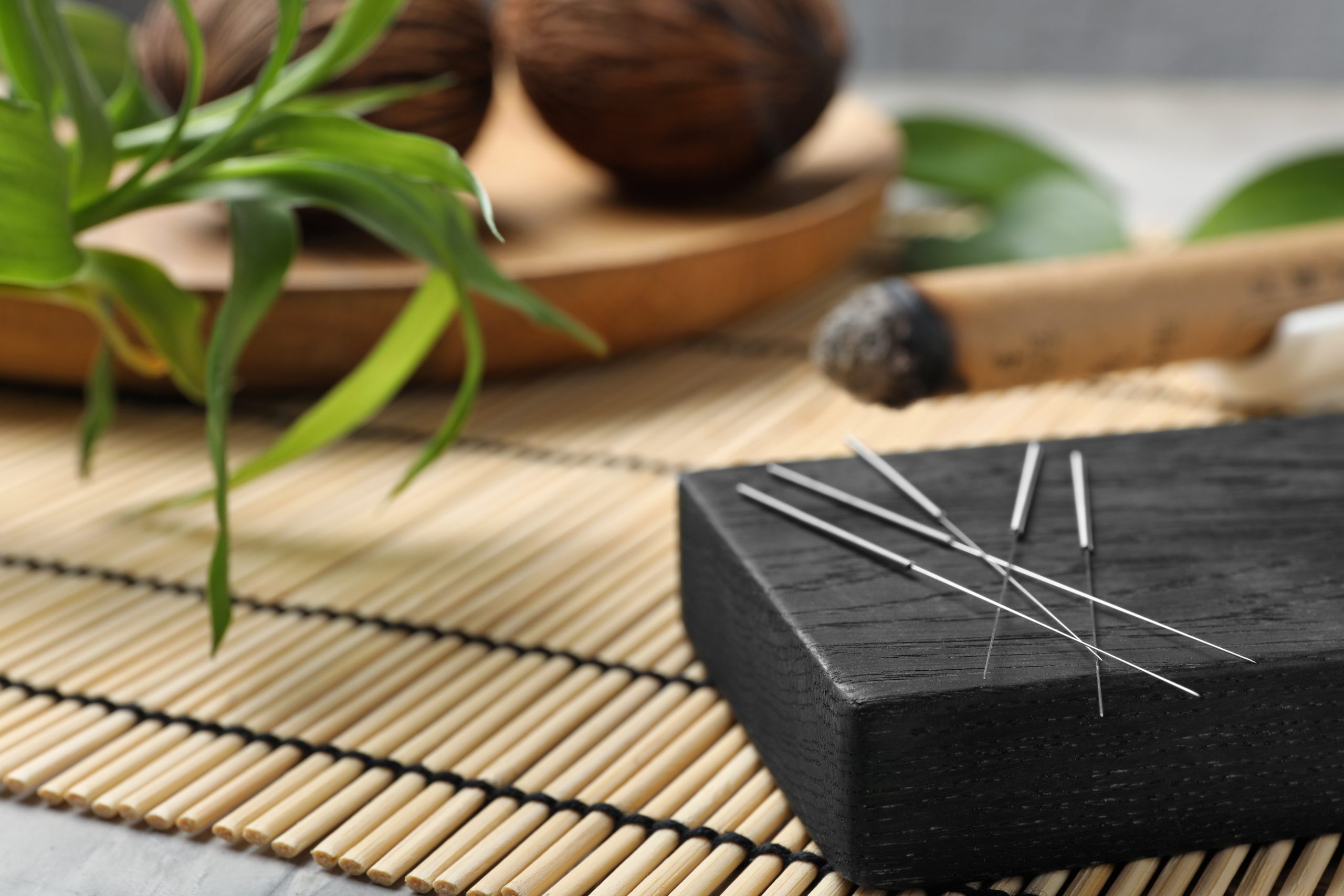Acupuncture
We treat the whole patient, not the disease
Acupuncture
Acupuncture is an excellent complement to chiropractic care when doctors see evidence of disrupted energy pathways. These pathways, called meridians, allow healing energy to move through your body. With this centuries-old healing method, doctors focus on the integrity of all of the systems in the body, not on specific conditions.

Schedule Your Discovery Call
What is Acupunture?

Acupuncture is an ancient practice of Traditional Chinese medicine that promotes natural healing and enhanced functionality in the body. A practitioner will gently insert fine needles into the skin at precise acupuncture points. These needles are then stimulated using heat or electricity to alleviate symptoms and encourage the flow of energy.
What About the Needles?
Patients often wonder about the needles we use during acupuncture sessions. Unlike large hypodermic needles and sewing needles, acupuncture needles are exceptionally thin. In fact, five of our needles could easily fit inside just one hypodermic needle!
Frequently Asked Questions about Acupuncture?
Traditional Chinese medicine explains that channels of energy run though the body and along its surface. These energy channels, called meridians, are like rivers flowing through the body to irrigate and nourish the tissues. An obstruction in the movement of these energy rivers is like a dam that creates a backup.
The meridians can be influenced by needling the acupuncture points. The acupuncture needles unblock the obstructions at the dams and reestablish the regular flow of the meridians. Acupuncture treatments can therefore help the body’s internal organs correct imbalances in their digestion, absorption, energy production, and in the circulation of their energy through the meridians.
The modern scientific explanation for acupuncture is that needling the acupuncture points stimulates the nervous system to release chemicals in the muscles, spinal cord, and brain. These chemicals will either change how the body experiences pain, or they will trigger the release of other chemicals and hormones that influence the body’s own internal regulating system.
The improved energy and biochemical balance produced by acupuncture stimulates the body’s natural healing abilities and promotes physical and emotional well-being.
Acupuncture is an ancient medical art, and there are many approaches to learning and practicing it. Medical acupuncture is the term used to describe acupuncture performed by a doctor who is licensed in Western medicine with thorough training in acupuncture as a specialty practice. Acupuncture doctor will use a combination of the two approaches as-needed to treat an illness.
Medical acupuncture is a system that can influence three areas of health care:
- promotion of health and well-being
- prevention of illness
- treatment of various medical conditions
While acupuncture is often associated with pain control, in the hands of a well-trained practitioner, it has much broader applications. Acupuncture can be effective on its own or in support of other medical treatments. The World Health Organization recognizes the use of acupuncture in the treatment of a wide range of medical problems, including:
- Digestive disorders: gastritis and hyperacidity, spastic colon, constipation, diarrhea
- Respiratory disorders: sinusitis, sore throat, bronchitis, asthma, recurrent chest infections
- Neurological and muscular disorders: headaches, facial tics, neck pain, rib neuritis, frozen shoulder, tennis elbow, various forms of tendinitis, low back pain, sciatica, osteoarthritis
- Urinary, menstrual, and reproductive problems
Acupuncture is particularly useful in resolving physical problems related to tension, stress, and emotional conditions.
The number of treatments needed differs from person to person. Speak to your doctor about the number of treatments you may need for your particular condition.
Usually not. As energy is redirected in the body, internal chemicals and hormones are stimulated and healing begins to take place. Occasionally the original symptoms worsen for a few days. Other general changes may develop related to appetite, sleep, bowel or urination patterns, or emotional state. These should not cause concern, as they are simply indications that the acupuncture is starting to work. It is quite common with the first one or two treatments to have a sensation of deep relaxation or even mild disorientation immediately following the treatment. These pass within a short time and never require anything more than a bit of rest to overcome.
People experience acupuncture needling differently. Most patients feel only minimal pain as the needles are inserted; some feel no pain at all. Once the needles are in place, patients will feel no pain. Acupuncture needles are very thin and solid, and they are made from stainless steel. The point is smooth (not hollow with cutting edges like a hypodermic needle) and insertion through the skin is not as painful as receiving injections or giving a blood sample. The risk of bruising and skin irritation is less than when using a hollow needle.
Yes. Today acupuncture is practiced widely in Asia, the United States, and in Europe. Acupuncture treatments can be given at the same time other techniques are being used, such as conventional Western medicine, osteopathic or chiropractic adjustments, and homeopathic or naturopathic prescriptions. It is important that your acupuncture doctor knows everything about your medical treatment plan so that he or she can help you get the most benefit from all your treatments.
No. Acupuncture is used successfully on cats, dogs, horses and other animals. These animal patients do not understand or believe in the process that helps them get better. A positive attitude toward wellness may reinforce the effects of the treatment received, just as a negative attitude may hinder the effects of acupuncture or any other treatment. A neutral attitude (“I don’t know if I really believe in this.”) will not block the treatment results.
Yes. To enhance the value of a treatment, the following guidelines are important:
- Do not eat an unusually large meal immediately before or after your treatment.
- Do not over-exercise, engage in sexual activity, or consume alcoholic beverages within 6 hours before or after the treatment.
- Plan your activities so that after the treatment you can get some rest or at least not have to be working at top performance. This is especially important for the first few visits.
- Continue to take any prescription medicines as directed by your regular doctor. Substance abuse (drugs and alcohol) especially in the week prior to treatment, will seriously interfere with the effectiveness of acupuncture treatments.
- Remember to keep good mental or written notes of what your response is to the treatment. This is important for your doctor to know so that the follow-up treatments can be designed to best help you and your problem.
Get Started Today
Step 1 New Patient Exam
Step 2: Diagnostic Testing
Step 3: The Journey


